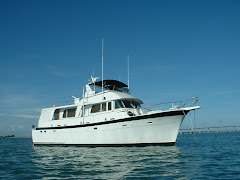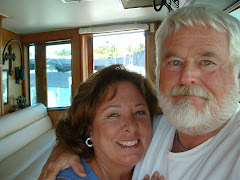It is really impossible for us to claim any sort of intimate knowledge of this country, since most of our time has been spent in boatyards and marinas. A few months are really too short a time to learn very much about anyplace you go.
However, we have formed our initial impressions, and will share them with you here.
The Economy
Chaguaramas is somewhat isolated from the rest of the country, an enclave devoted to the yacht service industry, as well as repair facilities for the local fishing fleet. The Trinidadian Coast Guard also has a base here. The commercial port is in Port of Spain.
The larger economy of Trinidad is driven by the exploitation of oil and gas reserves. Revenue from the export of these two natural resources is the basis of most of the government’s revenue, and thus the companies involved in the oil business are catered to by the various government agencies and departments. It is unclear how this segment of the economy directly benefits ordinary people, since the number of Trinidadians actually employed in the oil industry is rather small.
The second largest segment of the economy is the marine service industry, comprised of the businesses serving both private yachts and commercial fishermen. Private yacht owners spend an average of $20,000 during a three or four month stay in Trinidad. Many owners store their boats here for extended periods while they travel to their home ports to attend to their families, business interests, or homes ashore. There are approximately 1,000 yachts here at any given time, the bulk of them “on the hard” for hurricane season. Owners are from all over the world. We have met lots of Europeans, including British, French, Swiss, and Spanish nationals. There are a fair number of Australians and New Zealanders, and of course a ton of Americans.
With the exception of Tobago, there is no discernible Tourism industry. On the island of Trinidad, as far as we can see, there is not much official interest or government focus on developing one. The countryside is beautiful, much of it mountainous, with several distinct eco-systems. Beaches abound on the north side of the island.
There is no personal income tax. However, they levy something called the “Value Added Tax”, on a wide variety of selected goods and services, which appears to be something like a sales tax. The Trinidadian Customs Service levies fairly steep duty charges on most imports.
Social Structure
The local population appears to be primarily composed of people descended from of Africans and East Indians, mixed with Latin Americans, a few Europeans (primarily Dutch) and a very small remnant of the indigenous Carib Indian tribes. Over time, there has been a good bit of intermarriage, so racial and ethnic lines are somewhat blurred. There is an undercurrent of racial consciousness in some areas. We are told that there are enclaves (small towns or villages) where people of a particular ethnic extraction appear to have concentrated to the virtual exclusion of others. But we have not personally seen this. We have not directly seen or experienced much in the way of overt racial tension between the various ethnic groups, but we know from reading the local newspapers that it does exist.
We have personally enjoyed meeting Hindus, Muslims, Christians, and Rastafarians, all of whom have been well represented among the business owners, craftsmen, and workers that we have engaged during our stay. Our observation has been that business owners, managers, and professionals tend to be mostly of East Indian extraction, whereas clerks, craftsmen, and laborers tend to be Africans. This has been remarked upon by many of the other cruisers we’ve met, and confirmed by Trini’s we have befriended.
What follows are two generalizations we have come to feel are somewhat valid, but we want to acknowledge that we have seen and experienced remarkable exceptions.
People of East Indian and Asian extraction seem to bring with them a particularly keen cultural desire, or drive, to start family businesses. Working together, and by pooling their resources, they are able to raise the capital to start or buy businesses of all kinds, both large and small. They tend to see to it that their young people get the best education available to them, and expand their influence in the marketplace.
We don’t entirely understand why, but in this culture, people of African extraction appear to be less driven to educational, commercial or professional achievement. It isn’t that they are unwilling to work hard. Overall, our experience with local craftsmen and contract labor has been good. As a rule, the quality of their work has been more than satisfactory, and in some cases, exceptionally good. Admittedly, we have only engaged workers that have been recommended to us by others. On only one occasion, a contract worker started a job, and then abandoned it with no notice of his intentions for more than a week. We hired another fellow to complete that job during his absence.
Subscribe to:
Post Comments (Atom)


No comments:
Post a Comment